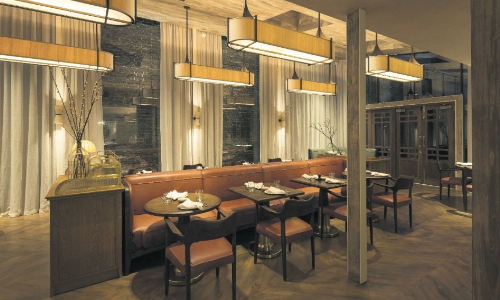Review: Luca

Isaac McHale was such a rebellious Young Turk that while he was still cheffing at the Ledbury, he ran a series of pop-ups under the name The Young Turks.
He and James Lowe – then the head chef at St John Bread and Wine – would serve up whatever they damn-well pleased, in venues not generally conducive to a nice meal out; a condemned building in Canary Wharf, the back room of a pub, a disused car-park.
They were foraging before it was de rigueur to forage and they were banging on about sustainability before virtually everything in London became sustainable. The food kids went wild; these wunderkinds were cooking at the best restaurants by day, and making it up as they went along by night. They were having their cake and eating it, and it was a literal cake, made with stuff they found in a bush.
A permanent restaurant inevitably followed; McHale’s The Clove Club at Shoreditch Town Hall sent the foodie world into dizzy raptures. It took modern British staples, gave them a Scandi or Basque or Korean twist, stuck in some herbs you’ve never heard of and created something entirely its own.
Not many restaurants can claim to be truly influential, but it’s hard to imagine Lee Wescott’s Typing Room, or Adam Handling’s The Frog without The Clove Club. And last summer, while everybody was busy wringing their hands about what a terrible year 2016 had been, The Clove Club became only the third British entry into the World’s 50 Best Restaurants list (McHale’s former gig, the Ledbury, being one of the others).
So what would his next trick be? What experimental venture could possibly follow? Perhaps a restaurant housed inside a giant terrarium, where diners can pick their own herbs from under the table? Oh no, it’s better than that. This one will kill you. It’s an Italian.
A nice, upmarket, fairly traditional Italian. Sure, it uses British ingredients (Britalian, they say, but don’t hold it against them) but that’s practically obligatory these days. The whole enterprise feels like a masterstroke in normcore misdirection: it’s exactly the thing you weren’t expecting.
“You have to go,” insisted a foodie friend. “The parmesan fries are to die for.”
The hand-painted sign outside suggests somewhere intimate, and I was expecting a dining room roughly the size of North Road, the now sadly defunct Scandi restaurant a few doors down. But the slim bar opens into a wide, high space filled with smart leather banquettes and linen drapes and parquet floors. It’s not exactly opulent, but it’s certainly swish; a long way from a car park roof.
Our waiter – a tall, posh, rosy-cheeked chap whose tragus piercing hints that he was probably one of the cooler kids in his public school – explained that the menu is structured the Italian way, with antipasti followed by primi and secondi courses. This means you can easily consume a lot, and therefore spend a lot, especially given none of this stuff is cheap, and some of it is bloody expensive.
But when it’s as well prepared as this – never flashy but consistently pleasing – it’s hard to whinge.
Scallops, nicely cooked, were fixed to their shells by a splodge of sweet Jerusalem artichoke and thinly spread with a hint of nduja; I’m usually of the “less is more” school when it comes to shellfish, but these worked. A chunky, wine-cured beef tartare is elevated from the ordinary by a bold, creamy sheep’s milk cheese.
The pasta is, of course, all freshly prepared, and is deliciously, uncannily springy (the head chef learned from his nonna, apparently). Rigatoni with pork sausage is given an unseasonally summery – but not unwelcome – twist with the addition of mint leaves. Tiny pockets of pheasant and mushroom agnolotti, meanwhile, float in a rich, amber consomme that’s a bit too forceful for the meek filling.
Traditional Italian mains – often just islands of meat or fish unanchored from the rich flavours of previous courses – can struggle to impress the neanderthal British palate, and Luca doesn’t go the whole hog. Lamb chops, with a buttery layer of fat as thick as your thumb, come with rosemary breadcrumbs and crushed veg. Sea bass in the style of a prostitute – alla puttanesca to the Italians – is superb, the sauce giving it a nice, sharp kick, a single, handsome new potato rounding things off.
To finish, El Pye ordered “5 ages of parmesan”, which comes with its own hand-drawn diagram and a potted history. The concept is fairly self-explanatory – variously aged blocks of cheese made from the milk of a rare cow – and it is interesting, I guess, but not £21 interesting. Not when there’s a flaky apple crostata on the menu at a third of the price. But sod it, if you order a £21 plate of parmesan, you deserve to get stung; good on you McHale, you saw her coming.
Luca is a good restaurant. It’s a solid restaurant. It may even be a great restaurant, although it’s hard to tell. It spends so much time getting the basics absolutely right that there’s little room for frills or surprises. Perhaps it’s a sign that McHale’s burgeoning empire is growing up, getting serious.
“How were the parmesan fries?” asked my foodie friend the next day.
I had forgotten to order the parmesan fries (which, I hear, are actually more like heavenly, savoury churros than proper fries. Wonderful, I hear, absolutely wonderful).
“That was the whole point,” she sighed.
At least going back won’t be a chore.
First published in City A.M.

